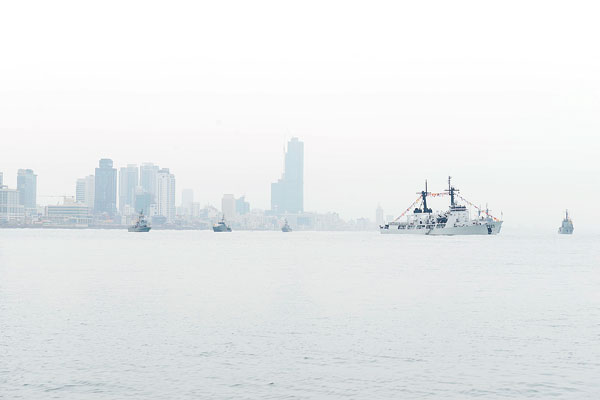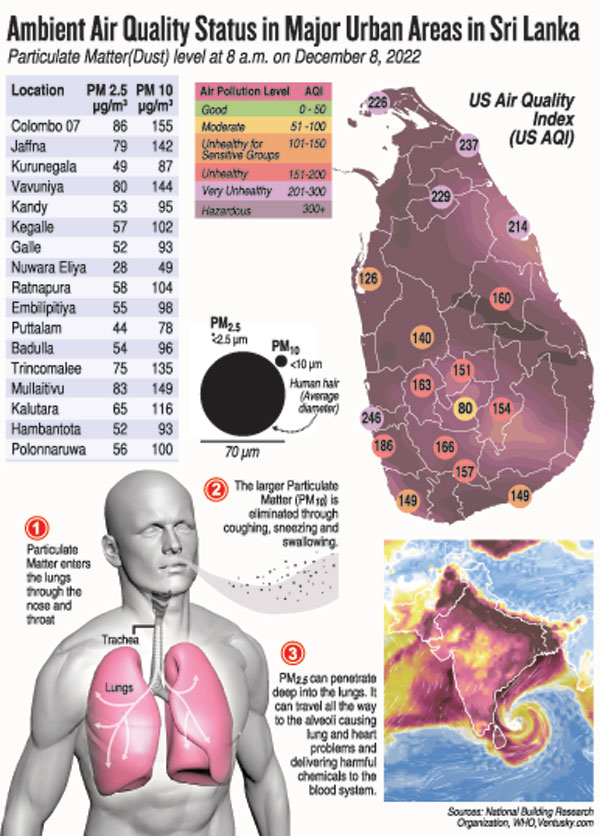News
Air pollution: We can’t control situation in region but we must stop localised sources, says expert
View(s):- Health official warns that in this “acute” but transient phase of high air pollution, people can come down with mild symptoms but at the other end death too
By Kumudini Hettiarachchi
No, they are not rain clouds but the impact of air pollution conditions, it is learnt.
Confirming that it is a “haze” not mist as mistakenly referred to by many, Research Associate of Verite Research, Ashani Basnayake, explains that two factors are contributory causes for this air pollution.
The first is ‘meteorological conditions’ and the second ‘localised sources’, she says, delving deep into detail.

Haze over Colombo on Friday. Pic by Indika Handuwala
Under meteorological (weather) conditions, Ms. Basnayake says:
- Colombo has two distinct seasons for air pollution – the periods of the northeast monsoon and the southwest monsoon. We are currently experiencing the northeast monsoon which brings in ‘stable’ air conditions. This means that the wind and rain do not sweep up the dirty air unlike the southwest monsoon. As such, particulate matter remains in the atmosphere without moving.
- This week, on Wednesday and Thursday (December 7 and 8), we had the added issue of a very strong depression over the Bay of Bengal that was pulling all the polluted air across South Asia.
Under localised conditions, she reiterates that Colombo produces plenty of its own pollution. Here, the National Building Research Organization (NBRO), estimates that the two primary sources are around 60% from vehicular traffic and 25% from local power plants. Other additional sources are open burning (garbage) and dust from construction sites. This is while topography can also play an important role, according to her, as she cites the case of Kandy city located in a valley and as such particles being unable to move away easily.
Next she looks at the numbers with regard to the Air Quality Index (AQI) and says that it has been deteriorating since November 16.
- In the week starting November 28 (last week), our AQI was around 155.
- This week on Wednesday (December 7), the AQI was around 170 and on Thursday (December
 it hit around 180 until around 4 p.m., when some passing showers helped improve air quality. It was only then that we moved from the danger ‘red’ category to the ‘orange’ category. On Friday too we were in the orange category, with minor showers helping in the slight improvement of conditions.
it hit around 180 until around 4 p.m., when some passing showers helped improve air quality. It was only then that we moved from the danger ‘red’ category to the ‘orange’ category. On Friday too we were in the orange category, with minor showers helping in the slight improvement of conditions. - Quite a lot of other areas in Sri Lanka also experienced high levels of air pollution during this period.

Ashani Basnayake
“When the AQI is between 151 and 200, it is ‘unhealthy’ for all groups. People only began noticing the issue when the thick haze fell over the city,” says Ms. Basnayake, pointing out that the depression will weaken by this weekend. However, the additional pollution brought on by the depression over our localised sources will not disperse immediately, as we are experiencing stable air conditions. Rain, though, will help in faster dispersion.
She stresses that while Sri Lanka cannot control what is happening in the region, it is vital to look inward and take urgent measures to halt pollution through localized sources. The need of the hour is for policymakers to bring in public transport and energy reforms to tackle pollution at the source. Black-smoke belching vehicles should be taken off the roads. The country should also move to renewable energy and away from fossil fuels.
Harking back to the time before COVID-19 (2017, 2018 and 2019), Ms. Basnayake says that even when there was no depression to blame and winds were not sweeping over India, Colombo’s population was breathing air in the unhealthy categories. Data between November and February for those years, found that the people were breathing air in the unhealthy categories (red and orange) around 60% of the time.
The ‘main culprits’ for air pollution, the Sunday Times understands, are fine particles (PM2.5), course particles (PM10), Sulphur Dioxide (SO2), Nitrogen Dioxide (NO2), tropospheric ozone (O3) and Carbon Monoxides (CO). Fine particles (PM2.5) are particularly dangerous as their size allows them to enter not only people’s lungs, but also their bloodstream as well, through the respiratory tract.
| College of Pulmonologists on poor air quality The accumulation of toxic gasses and fumes in the atmosphere is generally considered as air pollution. Air quality is measured using the standard Air Quality Index (AQI), says the Sri Lanka College of Pulmonologists which is headed by Dr. Ravini Karunatillake. The college states: “According to the World Health Organization (WHO), AQI should be less than 50. If the AQI exceeds more than 100, it is unsafe and can adversely affect human health directly and indirectly. “In Sri Lanka, the usual AQI does not exceed 150, but due to the recent climatic condition in the region, it has equalled that of New Delhi in India, on Thursday (December 8). “This is categorised as ‘unhealthy’ according to the WHO. We believe this climatic situation is transient and will resolve soon.” | |

Dr. Chandana Kulathunga
Effects on health and what can be done in this period of transient poor air quality
The urgent need is to take serious heed of the transient poor air quality prevailing in Sri Lanka, reiterated Consultant Respiratory Physician Dr. Chandana Kulathunga, attached to the Matara District General Hospital, guiding people on what to do.
He said that in this “acute” but transient phase where there is very high air pollution, people can come down with mild symptoms but at the other end death too.
The symptoms could be both in the upper respiratory and lower respiratory tracts. They are:
- Cough
- Wheezing
- Runny nose
- Irritation of the throat
- Pneumonia
Dr. Kulathunga warned that there is enough scientific evidence that there are toxic gases and dust particles circulating in the air. Another grave danger is that these dust particles can carry micro-organisms which cause upper respiratory tract infections as well as the lower respiratory tract infection of pneumonia.
“Another factor that needs to be taken into account is that this November-December period is also a peak for viral infections including influenza and COVID-19. There is a double danger here because with poor air quality, these infections which are circulating among the people can spread fast and furiously,” he said.
He also alerts that when there is acute poor air quality for a prolonged period, people can suffer heart attacks (Myocardial Infarctions – MIs).
Some simple measures that could ward off the effects of poor air quality, according to Dr. Kulathunga are:
- Wear a face mask when going outdoors until the air quality improves. The mask provides “double safety” – it would prevent toxic air entering the lungs through breathing and also stop infectious bugs from getting into a person’s respiratory system,
- Remain indoors as much as possible even though it is the season of shopping and holidaying. Go outdoors for essentials only.
- When in school, children should be kept indoors and not sent out for sports or play to the grounds.
- As the condition of people who have existing lung issues can get worse, if there is a deterioration in their condition, they need to seek medical treatment immediately. Do not waste time resorting to home remedies.
- As smokers are very vulnerable to illness when there is poor air quality, stop smoking even temporarily.
- High-risk groups should, if possible, get the influenza (flu) vaccine.
This Consultant Respiratory Physician says that the high risk groups include the elderly, the very young, expectant mothers, those with chronic lung disease and those with cardiac disease.
“However, it is better for all men, women and children to take precautions against falling ill,” he adds.
The best way to say that you found the home of your dreams is by finding it on Hitad.lk. We have listings for apartments for sale or rent in Sri Lanka, no matter what locale you're looking for! Whether you live in Colombo, Galle, Kandy, Matara, Jaffna and more - we've got them all!

